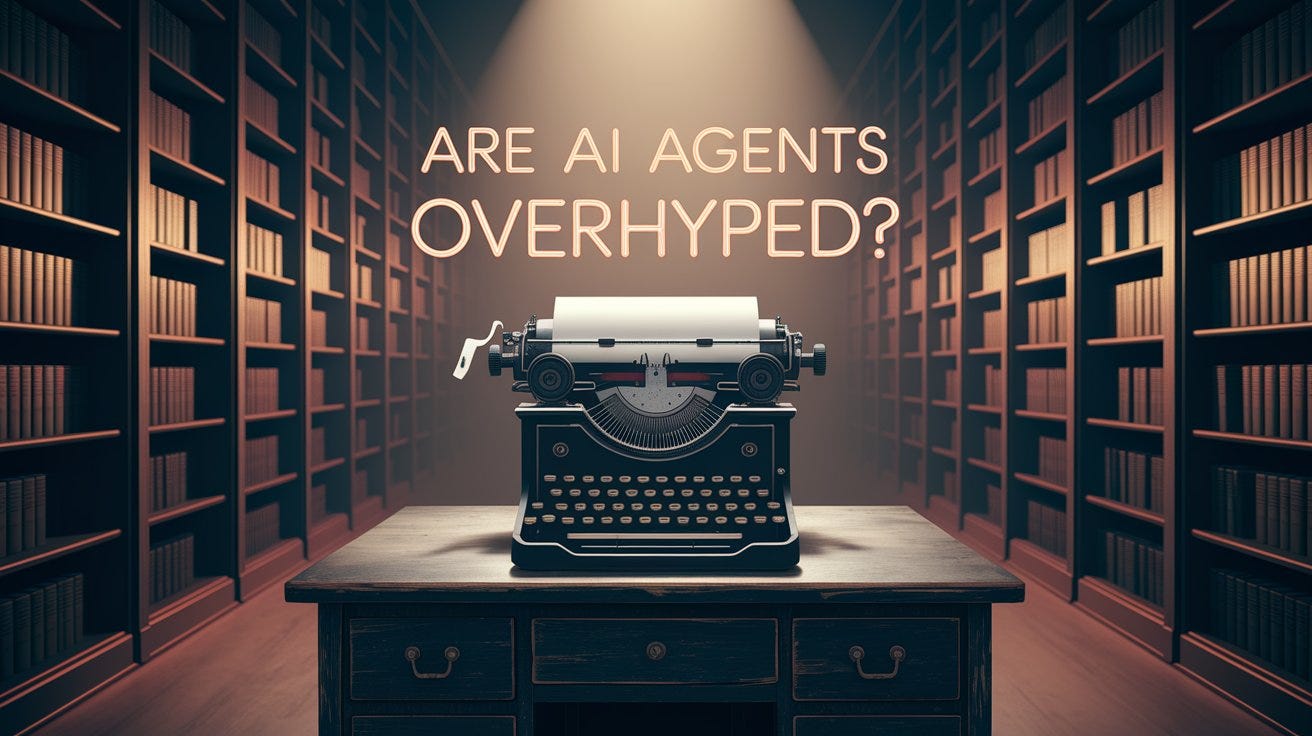The AI Agent Frenzy
If you’ve spent even five minutes on tech Twitter, LinkedIn, or Reddit lately, you’ve seen the buzz: “AI agents will automate your life!” “They’ll code, write, and even negotiate for you!” But here’s the million-dollar question: Are AI agents truly revolutionary, or is this just another overhyped tech bubble?
As AI learners, you’re bombarded with promises of a future where autonomous agents handle everything from customer service to complex decision-making. But let’s cut through the noise. In this deep dive, we’ll explore:
What AI agents actually do today.
Where the hype exceeds reality.
Why critical thinking matters in the age of AI FOMO.
What Are AI Agents? (And Why Everyone’s Obsessed)
Before we dissect the hype, let’s define our terms.
AI Agents are software programs designed to perform tasks autonomously by perceiving their environment, making decisions, and acting to achieve specific goals. Think of them as:
Digital Assistants (e.g. Siri, Alexa).
Chatbots (e.g. ChatGPT, Claude).
Sophisticated Systems (e.g. self-driving cars, algorithmic traders).
Why the hype? Three words: automation, scalability, and potential. AI agents promise to:
Eliminate repetitive work (e.g. scheduling, data entry).
Solve complex problems (e.g. medical diagnosis, climate modeling).
Learn and adapt without constant human oversight.
But here’s the catch: Potential ≠ Reality. Let’s unpack why.
Why AI Agents Are (Partly) Overhyped
1. “Autonomous” Doesn’t Mean “Flawless”
Headlines scream: “AI agents can replace humans!” But autonomy ≠ perfection. Today’s agents:
Struggle with ambiguity: Ask ChatGPT to resolve a nuanced ethical dilemma, and it might hallucinate.
Depend on training data: Biases, gaps, or outdated info limit reliability.
Require human oversight: Errors in code, misinterpreted prompts, or security risks still need human checks.
Example: An AI customer service agent might handle 80% of queries but fail catastrophically on edge cases (e.g. legal disputes).
2. The “Jack of All Trades” Fallacy
Many pitch AI agents as Swiss Army knives: “One agent to rule them all!” But in reality:
Specialization wins: An agent trained for medical diagnosis won’t excel at stock trading.
Context matters: An agent that thrives in structured data environments (e.g., supply chain logistics) may struggle in creative tasks (e.g. writing poetry).
Reality check: Narrow AI dominates. General AI (AGI) is yet to be a reality.
3. The Scalability Illusion
Yes, AI agents can scale tasks—but scaling requires:
Infrastructure costs: Training and running models like GPT-4 isn’t cheap.
Regulatory hurdles: Privacy laws (GDPR), copyright issues, and ethical guidelines limit deployment.
Bottom line: Scaling isn’t as simple as flipping a switch.
Before you dismiss AI agents as hype, let’s acknowledge their legitimate breakthroughs:
1. Automation at Unprecedented Speed
AI agents excel at tasks with clear rules and patterns:
Data analysis: Processing terabytes of data in minutes.
Content generation: Drafting emails, reports, or code snippets.
Customer support: Resolving FAQs 24/7.
Example: GitHub Copilot writes code faster than humans—but still needs review.
2. Democratizing Expertise
AI agents make specialized knowledge accessible:
Healthcare: IBM Watson assists in diagnosing rare diseases.
Education: Personalized tutoring bots adapt to student needs.
3. Accelerating Innovation
AI agents help researchers:
Simulate drug interactions.
Optimize climate models.
Design new materials.
Key takeaway: AI agents are powerful tools—when used correctly.
Human + AI: A Winning Team?
Here's the real secret: AI agents work best as assistants, not replacements. Companies that rely completely on AI often face trouble, but those who combine human oversight with AI tools see much better results.
Think of AI agents as copilots. They help steer the plane, but a human pilot must always be there to ensure everything runs smoothly.
How to Make AI Agents Work for You
Use them for simple tasks first: Let AI handle straightforward jobs like scheduling or basic customer responses.
Always check their work: AI agents still need human oversight to catch mistakes early.
Keep expectations realistic: Understand their limits, and don't expect perfection from day one.
How to Stay Ahead as an AI Learner
Focus on fundamentals: Master statistics, ethics, and domain-specific knowledge.
Build small projects: Create a task-specific agent (e.g., a resume parser).
Stay skeptical: Question grand claims. Demand evidence.
Remember: The next “AI revolution” will be built by those who balance optimism with critical thinking.
Final Thoughts: Are AI Agents Overhyped?
Yes and no. AI agents are incredibly promising but are often portrayed as flawless solutions. The reality? They're powerful tools with clear limitations.
By setting realistic expectations and combining AI with human insight, we can unlock their full potential.
In short, AI agents aren’t magic, but with careful use, they can still feel pretty magical.
Have you experienced similar challenges with AI agents? Share your story below and let's discuss the reality behind the hype!
And that’s a wrap for this edition! Stay tuned for more updates in the next newsletter. Until then, take care and stay curious!




